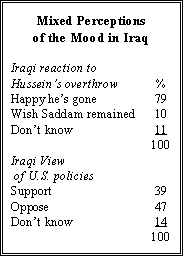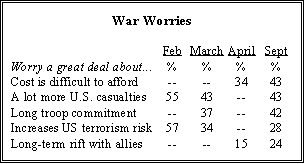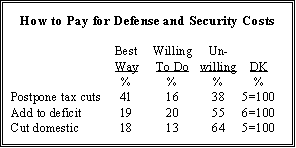Support ‘Significant’ U.N. Role
 Partisanship continues to strongly influence opinions on almost every aspect of the war in Iraq and its aftermath. This also is seen in attitudes toward the U.N.’s role in Iraq, though there has been a narrowing of differences about U.N. involvement since April.
Partisanship continues to strongly influence opinions on almost every aspect of the war in Iraq and its aftermath. This also is seen in attitudes toward the U.N.’s role in Iraq, though there has been a narrowing of differences about U.N. involvement since April.
Republicans are now much more supportive of the U.N. playing a significant role in establishing a stable government in Iraq, though most oppose sharing military control with the world body. Roughly two-thirds of Republicans (68%) currently favor the U.N. having a significant political role, up from 57% in April. However, only about a third (35%) want the U.N. to take the lead in establishing a stable government in Iraq, little changed from April (32%). And a majority of Republicans (57%) oppose giving up control over military decisions in Iraq to get other nations to provide troops.
Independents, by comparison, have become more supportive of the U.N. playing a political role and are willing to see the U.N. take the lead in forming a government. Just over half of independents (51%) believe the U.N. should have the most say in establishing an Iraqi government, up from 39% in April. As many independents as Democrats now support the U.N. taking the political lead in Iraq (51% vs. 48%).
Growing Partisan Gap
 While Republicans remain committed to the war, support among Democrats and independents has slowly declined over the summer. In April, after the fall of Baghdad, fully 58% of Democrats endorsed the decision to go to war. Democratic support for military action has dropped 15 points to 43%; fully half now say it was the wrong decision. Independent support for the war has also slipped 10 points since April (from 73% to 63%), while Republican remains very high (85%), and is only slightly lower than in April (92%).
While Republicans remain committed to the war, support among Democrats and independents has slowly declined over the summer. In April, after the fall of Baghdad, fully 58% of Democrats endorsed the decision to go to war. Democratic support for military action has dropped 15 points to 43%; fully half now say it was the wrong decision. Independent support for the war has also slipped 10 points since April (from 73% to 63%), while Republican remains very high (85%), and is only slightly lower than in April (92%).
The party split over current policy is just as stark. Republicans overwhelmingly believe the U.S. must keep troops in Iraq until a stable government is established there. Barely half of Democrats (52%) agree.
Democrats also believe the president should have waited to get the support of more major allies before taking military action in Iraq. Nearly two-thirds (64%) hold that view now, up from 43% in April. Most independents (54%) and Republicans (76%) think the timing of military action was appropriate.
Differing Perceptions

Nearly half of Americans (47%) now see the U.S. military effort in Iraq as going fairly well, while just 15% believe it is going very well. As the war was ending in April the consensus view, shared by roughly six-in-ten Americans, was that things were going very well.
Republicans continue to have a much rosier view of the war effort than do Democrats. Many more Republicans than Democrats feel things are going at least fairly well in the country (84% vs. 48%). More than six-in-ten Republicans (62%) say there have been fewer casualties than they anticipated. By contrast, most Democrats (51%) say there have been more casualties than expected.
 The public overwhelmingly believes that the Iraqi people are happy to be rid of Saddam Hussein. By nearly eight-to-one (79%-10%), people believe Iraqis are happy to be rid of the dictator and this view is shared across the political spectrum. But Americans are split over how Iraqis are reacting to current U.S. policies in the country. By a 47% to 39% margin, Americans think most people in Iraq oppose current U.S. policies in the country.
The public overwhelmingly believes that the Iraqi people are happy to be rid of Saddam Hussein. By nearly eight-to-one (79%-10%), people believe Iraqis are happy to be rid of the dictator and this view is shared across the political spectrum. But Americans are split over how Iraqis are reacting to current U.S. policies in the country. By a 47% to 39% margin, Americans think most people in Iraq oppose current U.S. policies in the country.
Concerns: Cost and Casualties
Overall, Americans are far more worried about the costs, in both dollars and lives, than about other possible consequences of the military operation in Iraq. On the heels of the president’s request for an additional $87 billion, fully 43% say they worry a great deal that the cost of the war in Iraq is difficult for the U.S. to afford. By comparison, just a third (34%) worried a great deal about this in April after the fall of Baghdad.
Many (43%) also worry that U.S. forces might sustain a lot more casualties, a worry that was prevalent both before and during the military engagement in late March of this year. And 42% worry a great deal that U.S. troops will be involved in the Mideast for years to come, a concern that has grown slightly since the start of the war.
 The public is far less worried that the presence of U.S. forces in Iraq will increase the risk of another terrorist attack in the U.S. Just 28% worry a great deal about this today. In February, prior to the war, fully 57% worried that taking military action might increase the chances of a terrorist attack in this country.
The public is far less worried that the presence of U.S. forces in Iraq will increase the risk of another terrorist attack in the U.S. Just 28% worry a great deal about this today. In February, prior to the war, fully 57% worried that taking military action might increase the chances of a terrorist attack in this country.
While only about one-in-four (24%) worry a great deal that the war will cause a long-term rift between the U.S. and its allies, this concern has grown somewhat since April, when only 15% of Americans worried about a diplomatic breakdown with traditional allies.
Majority Opposes More Spending

Opposition to the president’s funding request for the military and reconstruction effort is broad, but there are significant partisan and demographic differences in attitudes to the proposal. Conservative Republicans back the funding request by more than two-to-one (66%-30%), but moderate and liberal Republicans are divided (46% favor, 48% oppose). As might be expected, Democrats, both conservative and liberal, overwhelmingly oppose the proposal.
Roll Back Tax Cuts to Pay War Costs
Congress will soon take up the question of whether to approve the additional spending and will confront difficult choices about where to find the necessary money, given the growing federal budget deficit. Of the three principal options available, a 41% plurality favors postponing or reducing last year’s tax cuts as the best way to finance the new spending. The other two options cutting spending on domestic programs and adding to the budget deficit attract roughly equal levels of support (18% and 19%, respectively). This division of opinion on first-choice options has changed very little since prior to the start of the war.
 In addition to those who prefer postponing or reducing the tax cuts, another 16% are willing to see this done. Thus a majority of 57% sees this as an acceptable option for paying the costs of the war and reconstruction; 38% are opposed to tampering with the tax cuts. In contrast, 64% are unwilling to cut domestic spending and 55% are unwilling to add to the deficit. All told, 14% of the public would not support any of the three options.
In addition to those who prefer postponing or reducing the tax cuts, another 16% are willing to see this done. Thus a majority of 57% sees this as an acceptable option for paying the costs of the war and reconstruction; 38% are opposed to tampering with the tax cuts. In contrast, 64% are unwilling to cut domestic spending and 55% are unwilling to add to the deficit. All told, 14% of the public would not support any of the three options.
Compared with Republicans, Democrats and independents are much more opposed paying for the war with cuts in domestic spending, and are somewhat more opposed to adding to the deficit. And fewer Republicans would choose to postpone the tax cuts as their first option. But overall, partisan differences are not dramatic. A majority of Republicans (55%) are willing to see the tax cuts as at least part of the source of the funding; at the same time, about one-third of Democrats (35%) are opposed to delaying or reducing the tax cuts.
Skepticism about the President’s Iraq Plan
Despite the belief that the war in Iraq was the right decision, a majority of the public now believes that the president does not have a clear plan for bringing the situation there to a successful conclusion. An even larger majority believes he has not explained his plans clearly.
 Just a third of Americans (32%) say the president has a clear plan; 58% think he does not. These opinions are strongly shaped by partisanship: a solid majority of Republicans (58%) saying he does have a plan, while only 18% of Democrats agree. Independents are closer to Democrats in this judgment. Only three-in-ten independents say the president has a clear plan for a successful conclusion.
Just a third of Americans (32%) say the president has a clear plan; 58% think he does not. These opinions are strongly shaped by partisanship: a solid majority of Republicans (58%) saying he does have a plan, while only 18% of Democrats agree. Independents are closer to Democrats in this judgment. Only three-in-ten independents say the president has a clear plan for a successful conclusion.
Partisan differences are also evident on the question of how well the president has communicated with the nation about his plans. Yet even Republicans, most of whom say the president has a plan, are divided over whether he has explained his plans clearly (46% say yes, 46% no).


